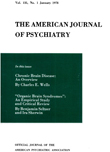Psychotherapy of borderline patients: the influence of theory on technique
Abstract
Although the treatment of borderline patients has attracted increased attention, there is little agreement on the basic nature of the disorder or the proper techniques for its treatment by analytically oriented psychotherapy. The author states that treatment based on the idea that the borderline patient achieves therapeutic gains by raging against an accepting therapist for a prolonged period of time is not so effective as treatment based on the recognition of specific ego defects as the core pathology. He suggests that the therapist be active in the treatment of borderline patients and not permit gross and unproductive distortions of the therapeutic relationship.
Access content
To read the fulltext, please use one of the options below to sign in or purchase access.- Personal login
- Institutional Login
- Sign in via OpenAthens
- Register for access
-
Please login/register if you wish to pair your device and check access availability.
Not a subscriber?
PsychiatryOnline subscription options offer access to the DSM-5 library, books, journals, CME, and patient resources. This all-in-one virtual library provides psychiatrists and mental health professionals with key resources for diagnosis, treatment, research, and professional development.
Need more help? PsychiatryOnline Customer Service may be reached by emailing [email protected] or by calling 800-368-5777 (in the U.S.) or 703-907-7322 (outside the U.S.).



